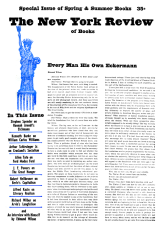Most writers of fiction practice a kind of housekeeping that is rare in life; they follow what might be called the Law of the Economy of Persons. In the real world, more than half of one’s acquaintances are of little or no significance. Not only are they not destined to become one’s friends, enemies, lovers, rivals or relatives—they do not even illustrate a principle, or exemplify a type.
In novels, or at least in the classic 19th-century novel which is still the model for most published fiction, everybody the hero meets is significant. Often, of course, this significance is not apparent at the time, but sooner or later it will be revealed. What is more, the hero does not have to meet more than one of each kind of person. If a demented cleaning-woman appears in Chapter Two, we can be sure that any other cleaning-women who may turn up later will be sane—that is, we make the opposite generalization from that which would be made in real life.
The Law of the Economy of Persons, when followed strictly, also requires that in the end every character should turn out to be somehow connected with the others. When the long-lost heir is found, he won’t be a stranger nobody has ever seen before, but the hero, or the hero’s best friend, or that interesting-looking boy who used to play in the churchyard.
Anthony Powell, who in spite of the contemporary wit and brevity of his style is a novelist in the classic tradition, follows these rules. In “The Music of Time,” the Proustian series of novels on which he is now engaged (The Kindly Ones is the most recent volume), the scene ranges from the stuffiest English country-house society to the middle depths of Bohemia, but in the long run almost everyone meets. Even when a character has appeared to sink completely out of sight for several books, he always turns up again, often in the most amazing conjunctions with other established characters. No one is ever wholly lost.
But in real life, people do disappear. What’s Become of Waring!, published in England in 1939, but issued here now for the first time, seems in the beginning to confront the problem directly. “T. T. Waring” is the pseudonym of a writer of immensely popular memoirs of travel and heroic adventure. No one has ever met him; he lives abroad and (like B. Traven) insists on keeping his real identity a secret. Early in the book, it is announced by the newspapers that he has died in Southern France. The rest of the story concerns the indirect effects of this “event” on the other characters, and the desultory revelation of more and more facts about Waring’s life and work. Among those present are Roberta Payne (“She was usually so well housed and dressed that it was generally supposed that obscure rich men, too dull to be allowed to appear, contributed something to her upkeep”), who claims to have been engaged to Waring; Captain Hudson, a serious young Army officer who is a devoted Waring fan; two rival contenders for the post of official biographer (books by them, or their doubles, are probably advertised in this journal right now); and a group of spiritualists. The narrator is another (or perhaps the same) one of Powell’s intelligent, immensely self-effacing young men, who works as a reader for Judkins and Judkins, T. T. Waring’s publishers.
Events move so rapidly and they are so fully described that one has to make an effort to read the book with the attention it deserves—to stop and notice the succinct skill and orginality with which Powell describes people, places and actions:
He munched a sandwich with neurotic violence. The champing of his teeth gave the impression that they had eluded their owner’s control, and that nothing short of a crowbar would put a stop to their crunching attrition.
Of course T. T. Waring is not really dead, and though he has tried hard to vanish, he does not succeed. It would be unfair to reveal what has become of him, but it conforms to the Law of the Economy of Persons in every respect. And though the question asked in the title is finally answered comically rather than seriously, this is a brilliant book. I especially recommend it to people whose friends keep telling them to read Powell, but who are put off by the idea of beginning a novel which has already gone to six volumes and is rumored to extend finally to twelve, and which is probably confused in their minds (most unfairly) with the steamy and portentous Alexandria series of Lawrence Durrell.
This Issue
June 1, 1963



